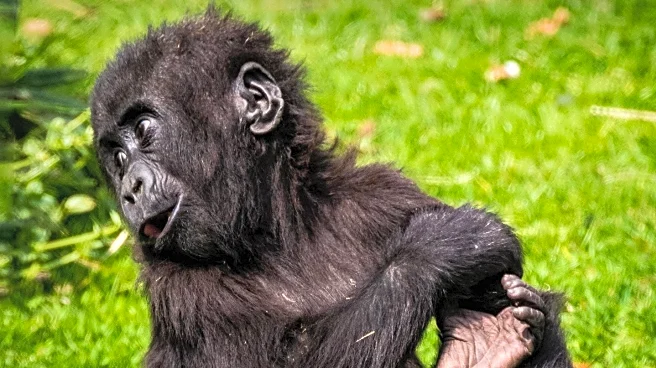What's Happening?
The Bristol Zoo Project has reported that intruders are causing distress to its gorilla colony after a video circulated online showing the animals at the closed Bristol Zoo Gardens in Clifton. The zoo, which closed to the public in 2022, is in the process
of moving its animals to a larger site. Despite the closure, the gorillas remain under the care of keepers while their new enclosure is being completed. The zoo has faced break-ins triggered by speculation and misinformation about the gorillas' welfare, leading to the activation of intruder alarms that disturb the animals. The zoo has emphasized that the gorillas are regularly seen by vets, zoo staff, and researchers, and are being prepared for their move to the new African Forest home where they will gradually be introduced to visitors.
Why It's Important?
The situation highlights the challenges faced by zoos in managing animal welfare during transitions and closures. The misinformation spread online has led to increased security concerns and distress for the gorillas, impacting their routine and preparation for relocation. This incident underscores the importance of accurate information dissemination and the potential consequences of public speculation on animal welfare. The zoo's response aims to reassure the public and protect the animals from further distress, emphasizing the need for responsible reporting and public engagement in wildlife conservation efforts.
What's Next?
The Bristol Zoo Project plans to continue its efforts to move the gorillas to their new home while addressing public concerns through factual communication. The zoo is enhancing security measures to prevent further intrusions and minimize distress to the animals. As the gorillas are introduced to their new environment, the zoo will focus on acclimating them to public interactions gradually. The ongoing situation may prompt discussions on the role of zoos in animal welfare and the impact of social media on public perception.
Beyond the Headlines
The incident raises broader questions about the ethical responsibilities of zoos in managing animal welfare and the influence of social media on public opinion. It highlights the need for transparency and effective communication strategies to counter misinformation and protect animal welfare. The situation may lead to increased scrutiny of zoo practices and the development of guidelines for managing transitions and closures in a way that prioritizes animal well-being.















